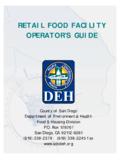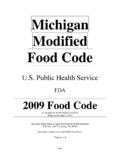Transcription of PowerPoint - Food Safety and Sanitation Guidelines
1 food Safety and Sanitation Guidelines Culinary Arts Copyright 2. Copyright Texas Education Agency, 2012. These Materials are copyrighted and trademarked as the property of the Texas Education Agency (TEA) and may not be reproduced without the express written permission of TEA, except under the following conditions: 1) Texas public school districts, charter schools, and Education Service Centers may reproduce and use copies of the Materials and Related Materials for the districts' and schools'. educational use without obtaining permission from TEA. 2) Residents of the state of Texas may reproduce and use copies of the Materials and Related Materials for individual personal use only, without obtaining written permission of TEA. 3) Any portion reproduced must be reproduced in its entirety and remain unedited, unaltered and unchanged in any way.
2 4) No monetary charge can be made for the reproduced materials or any document containing them; however, a reasonable charge to cover only the cost of reproduction and distribution may be charged. Private entities or persons located in Texas that are not Texas public school districts, Texas Education Service Centers, or Texas charter schools or any entity, whether public or private, educational or non-educational, located outside the state of Texas MUST obtain written approval from TEA and will be required to enter into a license agreement that may involve the payment of a licensing fee or a royalty. For information contact: Office of Copyrights, Trademarks, License Agreements, and Royalties, Texas Education Agency, 1701 N. Congress Ave., Austin, TX 78701-1494; phone 512-463-7004;. email: Copyright Texas Education Agency, 2012. All rights reserved.
3 3 Personal Hygiene Copyright Texas Education Agency, 2012. All rights reserved. Appropriate Attire 4. Wear Do Not Wear Apron False nails Chef jacket Fingernail polish Chef pants Jewelry Watches Hair restraint Dangling earrings Shoes (slip resistant) Rings Except for a plain metal band Copyright Texas Education Agency, 2012. All rights reserved. Wash Hands 5. Before Eating or drinking Handling raw meat poultry, or seafood Prepping food Putting on gloves Copyright Texas Education Agency, 2012. All rights reserved. Wash Hands 6. After Cleaning tables or busing dirty dishes Handling chemicals Handling money Handling raw meat poultry, or seafood (before and after). Removing chewing gum with your fingers Sneezing, coughing, or using a tissue Taking out garbage Touching clothing or aprons Touching your hair, face, or body Copyright Texas Education Agency, 2012.
4 All rights reserved. How to Wash Your Hands 7. 1. Wet hands and arms 2. Apply soap 3. Scrub hands and arms vigorously 4. Rinse hands and arms thoroughly 5. Dry hands and arms After Washing Your Hands 1. Use a paper towel to turn off faucet. 2. Use a paper towel to open restroom door. Copyright Texas Education Agency, 2012. All rights reserved. 8 Commercial Kitchen Safety Copyright Texas Education Agency, 2012. All rights reserved. Commercial Kitchen Hazards 9. Burns and Scalds Cuts Slips and falls General Kitchen Safety Copyright Texas Education Agency, 2012. All rights reserved. Safety Guidelines 10. Be sure to locate: Potential dangers Emergency exits and routes Handwashing stations First aid kits MSDS information Copyright Texas Education Agency, 2012. All rights reserved. Commercial Kitchen Safety 11. How to Safely Clean Spills in the Kitchen Preventing Burns Copyright Texas Education Agency, 2012.
5 All rights reserved. Fire Extinguisher 12. How to Use a Fire Extinguisher Know how fire extinguishers are classified Inspect the fire extinguisher Decide if you will evacuate or stay and fight Remember the acronym PASS. Pullthe pin Aim at the base of the fire Squeeze the lever Sweep back and forth Copyright Texas Education Agency, 2012. All rights reserved. 13 food Safety Copyright Texas Education Agency, 2012. All rights reserved. Foodborne Illness 14. Each year, 1 in 6 Americans (or 48 million people) gets sick from and 3,000 die of foodborne diseases. Reducing foodborne illness by just 10%. would keep 5 million Americans from getting sick each year. Copyright Texas Education Agency, 2012. All rights reserved. Causes of food Poisoning 15. Bacteria and Viruses Parasites Mold, Toxins, and Contaminants Allergens Copyright Texas Education Agency, 2012.
6 All rights reserved. Least Wanted Foodborne Pathogens 16. Campylobactor Salmonella Clostridium Staphylococcus botulinum aureus E. coli 0157:H7 Shigella Listeria Toxoplasma gondii monocytogenes Vibrio vulnificus Norovirus Copyright Texas Education Agency, 2012. All rights reserved. Long Term Effects 17. Kidney failure Chronic arthritis Brain and nerve damage Death Copyright Texas Education Agency, 2012. All rights reserved. Who's at Risk? 18. Pregnant women Older adults Persons with chronic illnesses Copyright Texas Education Agency, 2012. All rights reserve. Cleaning and Sanitizing 19. Prevents the spread of Cleaning removes food and dirt from pathogens to food . surface Steps: Sanitizing reduces pathogens on a 1. Clean the surface to safe levels surface 2. Rinse the surface 3. Sanitize Sanitizing the Kitchen the surface 4. Allow the surface to air-dry Copyright Texas Education Agency, 2012.
7 All rights reserved. References and Resources 20. Images: Culinary Arts, Harlingen High School South, Harlingen, Texas Microsoft Office Clip Art Textbooks: Culinary essentials. (2010). Woodland Hills, CA: Glencoe/McGraw-Hill. ServSafe Manager. 6th. Chicago, IL: National Restaurant Association, 2012. Print. ServSafe Starters Employee Guide , 5th. Chicago, IL: National Restaurant Association, 2010. Print. Websites: Least Wanted Foodborne Pathogens Texas Department of State Health Services General Publications Copyright Texas Education Agency, 2012. All rights reserved. References and Resources 21. YouTube : General Kitchen Safety The commercial kitchen is a busy environment that is full of many potential dangers that are both obvious and, in some cases, less obvious to the untrained person. When working in this environment, one must be aware of these potential hazards and how to avoid them.
8 How to Safely Clean Spills in the Kitchen Within a commercial kitchen one of the most frequent accidents that can occur is slipping on a wet surface. These types of accidents are particularly hazardous because often they can cause back injuries and cause serious lost time. In most cases these injuries are preventable with good Safety management of spills. How to Use a Fire Extinguisher Accidents happen. Be prepared to fight your own fire by learning how to use a fire extinguisher. Preventing Burns Within a commercial kitchen you will be exposed to high temperatures that could cause injury to you. Always think Safety and have a plan. Put Your Hands Together CDC Centers for Disease Control and Prevention Sanitizing the Kitchen Consumers can protect themselves by preventing the spread of germs by both cleaning and sanitizing surfaces where food is prepared.
9 This video explains how to make sanitizing solution with ingredients most people already have around the house. Copyright Texas Education Agency, 2012. All rights reserved.



